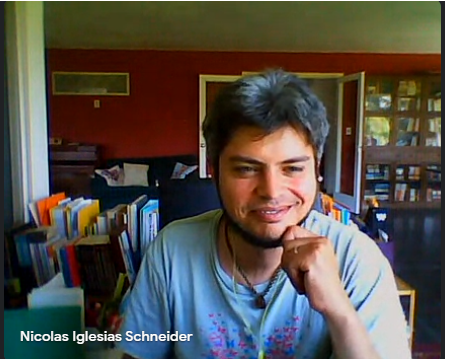
URUGUAY-
From ALC News we interviewed Nicolás Iglesias Schenider, Uruguayan social worker, co-author of the recently published book “De qué lado está Cristo” (Where Christ Stands) and a part of the project “Fe en la resistencia” (Faith in Resistance). He has just lauched as a producer a webseries for youtube named “Fe y derechos humanos en Latinoamérica” (Faith and Human Rights in Latin America).
Claudia: In ALC we already wrote a piece on the series, about the episodes, but I am interested in learning about its origins, the background of the series idea. You had the documentary “Fe en la Resistencia,” then you elaborated on religious fundamentalism. How did the idea of showing it as a series come up?
Nicolás: In 2018, we made the documenrary and got a lot of great feedback especially from elderly people of the believers community, of the social and political militancy who lived through those years, but the under-20s audience observed that it was too long, that the interviewed were veterans. It was good for a school activity or a church meeting but we realised that an eighty-minute’s documentary wasn’t a language that spoke to the youth, even if they were keen on the topic.
We realised then that we needed to come up with a briefer, audiovisual scheme . During this process the pandemic hit and we had to change the way: the scriptwriting was done on Whatsapp voice notes, not just face-to-face or zoom interviews, they are Whatsapp voice notes. And we went from Whatsapp to animation, this technique that resembles a computer game let’s say, at which a kid spends a lot of time. All of the artistic work was done by Víctor Aragón y Marilyn Reina, the audiovisual developers.
So, to answer your question, the origins of the series are fisrt all this process of looking for a language more understandable for young people, and second, the fact that, clearly from the area of ecumenic protestant churches, we are way behind in matters of language and the updating of communication tools.
Claudia: We have been discussing the need for a change in history sharing and the kind of discourse for a while now. I have been watching the episodes and I find them very understandable, accurate and the language, sharp. They are very short but those seven minutes contain a lot of stories. What was the effect with the first episodes?
Nicolás: It was challenging to condense the content in a few minutes for the interviewed, too. People used to talk for hours or dozens of minutes were asked to summarize their answers in a couple of minutes, to be asked to express themselves in a way possible to adapt to a graphic format was challenging. We wanted the story to be more than just abstract and theorethical, we wanted it to be real but not a ridiculous simplification of the idea. It was certainly challenging.
The feedback has been very positive, from all sides. We are seeing the video and the comments outside the ecclesiastical environment and the audience of the original “Fe en la resistencia”.
For example, I was called from a football club cafetería located in a northern neighbourhood, on the opposite side of the city we reside at, “Progreso del Barrio de la Teja” club, founded by former president Tabaré Vázquez, to organise a talk because they saw the miniseries video. This is great because it is evidence that the material has vastly exceeded the main militancy environments, religion, or human rights. Its broadcast on public TV on a Montevideo channel is also helpful, it gives the project an interesting reach because it is a channel watched by approximately seventy thousand viewers at that time.
These materials can be found in YouTube since short. Facebook has more complicated recent policies, the broadcast is more difficult compared to the experience.
Leonardo: I want to ask something I consider important. When you analize human rights-related processess like the dictatorships in Latin America, at your age, it is done from a non-participant point of view, so what you write is an interpretation from a generation who did not go through this. From your intuition as the creator of the idea, what is your hermeneutic contribution, and this generation’s, born in the 80’s or 90’s, to this topic?
Nicolás: The origins of what the contribution should be might have changed based on the experience, but our firm intention was to recollect the memories of resistence, persecution, without it becoming a logic argument of suffering, taking notes of the experiences of solidarity, resistence, work in social media, ecumenism; thinking that all those experiences of eclesiastical communities of opposition to the dictatorships could be an inspiration for new generations to commit themselves with human rights movements in each era.
I had the blessing of getting to know that generation very well, whose members are no longer with us or aged 80. I had the opportunity to be a part of the Latin American Church Councel and I am still in contact, I keep a long –dated (over 20 years) and deep dialogue with them, working together. I also have a strong educational eclesiastical bond as a professor at university, at schools, with people aged 15, 20, 22, so I’m constantly going back and for with the intergenerational dialogue. We want to recollect the resistence memories for them to serve as grounds for the resistence today. That was the main interpretational approach, the strategic key: creating and recreating. With the short series we see the importance of creating, recreating and supporting the social webs which gets polarized and fractured. All communities of believers go through contexts of polarization and a lack of background. We try to create webs.
Episodes at http://feenlaresistencia.com/ y en el canal de
YouTube:
